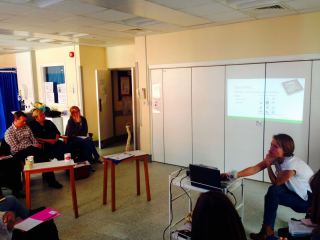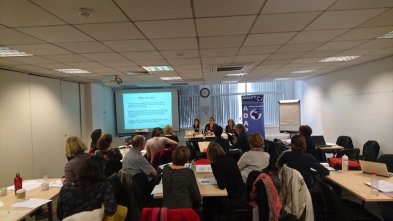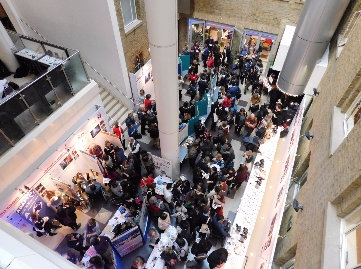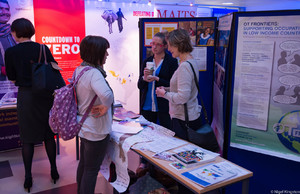News History
Browse the historical news that interested and inspired OT Frontiers, helping inform and form us into the network we are today.
Learn about unaccompanied and separated refugee and migrant children
This course is about the care and protection of unaccompanied and separated refugee and migrant children who are moving across and between countries. This course will provide an understanding of the risks and vulnerabilities these children face. It will inform the improvement of policy, practice and delivery of support services that uphold children’s rights and meet their best interests. The course will provide examples of promising practice. It will stimulate the exchange of ideas and experience between learners around the world and is available in English, French, Spanish and Arabic
Equipment Sent Abroad
David Lacy works for an equipment services company, NRS Healthcare, who wished to make good use of some equipment which was no longer being used. He selected carefully equipment which would be appropriate and useful in low-resource settings.
David arranged a donation of 16 items of children’s equipment to Physionet which took place on 27th February. This included postural seating, mobility aids, and standing frames. There is some information about the donation at:
David has said he hopes this will become an ongoing process, working with Physionet and other registered charities. All the equipment selected was manual and configurable. The community equipment service is commissioned by Cambridgeshire County Council and Peterborough City Council, who both agreed to the equipment donation taking place.
MAITS Impact Report & Annual Report 2016-17
MAITS specifically supports people with developmental disabilities such as cerebral palsy, autism and learning disabilities. They do this through a team of volunteers from all over the world, who are experienced professionals, and provide capacity-building training and resources to those caring for and providing health and education services to individuals with disabilities in community or institutional settings.
Their Impact Report, Annual Report can be found at:
http://www.maits.org.uk/wp-content/uploads/2017/11/Annual-Report-hi.pdf
OT Frontiers' AGM: AHPs Developing Synergies
Our first Annual General Meeting took place on 28th October 2017 at Hammersmith Hospital.
The theme of the day was AHPs Developing Synergies and was a day of networking, elections and presentations.
Committee elections took place and so the new committee is:
- Chairpersons: Mary Ann Waddell and Cecily Borgstein
- Vice Chairs: Dorothy Boggs and Camilla Cox
- Treasurer: Trish Chipman
- Secretary: Carolyn Atkinson
- Membership Secretary: Wendy Foo
There were 3 presentations related to the theme of the day, so from a Speech Therapist, Physiotherapist and Occupational Therapists......
Presentations:
Speech and Language Therapy in Low and Middle Income Countries by Lucie Hogger
Lucy is a Speech and Language Therapist. She has been working for 10 years with adults with acquired communication and swallowing disorders, predominantly neurological in inpatient and community NHS settings. She has worked in Uganda on several occasions since 2014 supporting service development in a Ugandan NGO for children with disabilities and providing CPD for graduate SLTs from Makerere University, Kampala, most recently a post graduate basic dysphagia course in June 2017 funded by MAITS. She is on the committee for Communication Therapy International and has completed an MSc in Neuroscience and Communication at UCL
In her session she presented:
- An overview of communication difficulties - developmental language disorder, social communication disorder, dysarthria, dysphonia, aphasia and cognitive communication disorders
- Common communication presentations in low and middle income countries
- Total communication tips, including a practical
- Making basic Augmentative and Alternative Communication Aids in LMIC
- Top tips for safer swallowing
Working as a Physiotherapist with UK-Med by Mary Jane Cole
Mary Jane talked about her experiences working as a physiotherapist with UK-Med in Gaza and Nepal. UK-Med provides emergency medical care in the aftermath of large and sudden-onset disasters. In Nepal UK-Med supported the deployment of two trauma specialist teams. This was followed by spinal injury specialist cells that combined medical, rehabilitation and nursing staff to provide surge support to a Spinal Injury Centre. In Gaza UK-Med and Handicap International supported a rehabilitation and nursing specialist cell to provide training and follow-up care for those with complex burns, amputations and spinal injury.
Training OTs in Uganda in 2017 by Carolyn Atkinson and Angela Wilson
Carolyn Atkinson and Angela Wilson are both Occupational Therapists who had just returned from Uganda, having completed a 3 day training with local OTs.
In their session they presented:
-An overview of the training event in Uganda
- A discussion about some of the issues that presented themselves during the training
- General issues related to organising training in low and middle income countries
ADAPT AGM
21st November 2017
Report by Mary Ann Waddell
The ADAPT (physiotherapists) study day in November challenged us to think about how we, as Allied Health Professionals, are responding to the very rapidly ageing population in low and middle income countries.
ADAPT is a clinical interest group within the Chartered Society of Physiotherapists on practice in low and middle income countries. OT Frontiers, ADAPT and Communication Therapy International (speech and language therapists) work together on some activities and projects.
Theme: Are we meeting the challenge of ageing in the developing world?
In 2015 12.3% of the global population were over 60, by 2050 it will be 21.5%, 75% of whom will be living in low and middle income countries and 46% of older people have disabilities, explained Rachel Albone of HelpAge International. These figures surprised me, I hadn’t realised the extent to which populations will be ageing in even the near future. Other presentations helped delegates think about our response as Allied Health Professionals.
Giulia Oggero described the Global Cooperation on Assistive Technology (GATE) project, a World Health Organisation initiative aimed at increasing access to assistive technology (equipment) across the world. It was easy enough to identify challenges of equipment provision such as proper initial assessment, sustainable clinical follow-up, supply, maintenance and more. We could see our role in training but we found it harder to identify how we might better reach older people who may have difficulty accessing services.
Several workshops raised further questions. Professor Nora Groce, of the Leonard Cheshire Disability and Inclusive Development Centre, told us of the concerning scarcity of data on ageing populations, without which it will be difficult for policymakers to act.
We began to realise how little attention older people are receiving in low and middle income countries and that
there is an issue here we need to respond to.
There were other interesting presentations and workshops on Assistive Paper Technology, on forced migration of older people and carers in Malawi for people who have had strokes
For more information about ADAPT go to: http://adapt.csp.org.uk/
Working with MDTs in Low and Middle Income Settings
OT Frontiers members, Dorothy, Cecily and Wendy, presented at ADAPT's November Conference and AGM. They sent out a survey to OT Frontiers members, asking for their perspective on working with MDTs in the low and middle income countries they had worked in. They used this information in their presentation with great success.
Wendy said "Our local colleagues deserve the most credit, it was their input that really elevated the whole presentation and made it credible! But also the rest of the membership deserve huge thanks for contributing to the survey."
Come and hear the presentation at our January 2017 meeting where Dorothy, Wendy and Cecily will do it all again!
Occupational Therapy International Online Network (OTION)
WFOT announced the launch of the Occupational Therapy International Online Network (OTION) on 15 June 2016.
This is an interactive forum that enables occupational therapists, assistants and students from across the world to network, share ideas and communicate with the profession as a whole.
OTION is free but requires users to register to post questions or responses.
The following forums have so far been set up:
-
Education
-
Practice
-
Research
-
Students
-
Working in another country
-
Studying in another country
-
Congress 2018
For more information or to access the forum go to:
http://www.wfot.org/Groups/OTInternationalOnlineNetworkOTION.aspx
UK WFOT Delegate Election Results
Following the recent elections we would like to welcome the new WFOT UK delegates and wish them success in their future work.
Sandra Rowan has been elected as Council member, International Affairs (WFOT) and UK WFOT Delegate and Gabrielle Richards is now the UK WFOT Alternate
Added July 2016
"The Zika babies - what do we know and what should be done?"
Date: Tuesday – July 26th, 2016
Time: 5.30pm – 7.00pm
Venue: LG6/7, Rose room, Keppel Street Building, LSHTM
The seminar will be followed by a drinks reception.
About the seminar:
The current Zika virus outbreak in the Americas is linked to an increase in microcephaly and other congenital abnormalities. There are more than 1600 confirmed cases of babies microcephaly/CNS disorders linked to Zika in Brazil alone, with a further 3000 under investigation. The seminar will describe what we know about the Zika virus and its relationship with congenital abnormalities, what early interventions may be helpful for the babies, and consideration of interventions to address psychosocial needs of the families. The seminar will be followed by a drinks reception. This event is jointly hosted by the International Centre for Evidence in Disability and MARCH, with funding from the Clinical Research Department.
For more information about the International Centre for Evidence in Disability (ICED), including the full schedule of seminars in the series, please see our website at: http://disabilitycentre.lshtm.ac.uk/
Added July 2016
International Conference ( 18th/19th Feb 2016) Disability in the Sustainable Development Goals: Forming Alliances and Building Evidence for 2030 Agenda
A number of us from OT Frontiers were lucky enough to attend this excellent (and free) conference, supported by a number of NGOs, notably Handicap International, cbm, Sightsavers, and the ICRC, which was held at the London School of Hygiene and Tropical Medicine in London.
The conference programme was a mix of plenary sessions and workshops grouped around a series of specific themes, including; access to health and rehabilitation; the role of poverty; disability measurement; Community Based Rehabilitation; education; inclusion measurement and inclusion promotion.
The organisers aim to widely disseminate the information shared at the conference, hence the programme, papers, workshops and posters are being made openly available on –line. You can watch the plenary sessions and workshops, and download the abstracts and posters here.
Following discussion, the key points compiled from each workshop are to be collated into a “Summary – and Call to Action” which will also be available from the above website.
From a personal point of view, I was excited by how interest in disability had, on paper at least, become mainstream. The rallying cry of the inclusive agenda, to ‘leave no-one behind’, was further reinforced by the use of standard tools to measure disability and its effects, notably the Washington Group disability statistics tools the WG Short Set of Questions on Disability and the Washington Group / UNICEF Module on Child Functioning and Disability.
I was strongly persuaded by the maxim being quoted ‘if you don’t count us, we don’t count’.
OT Frontiers had a visible presence at the conference along with ADAPT and a number of other special interest groups. Our ‘stand’ was set up by the team effort of Alison McCracken and Dorothy Boggs, and manned mainly by Mary Ann Waddell, and Trish Chapman who fielded enquiries and gave out a fair number our OTF cards.
Spot OT Frontiers in operation in the exhibition hall amongst the photos of the conference!
Much of what was being discussed at the symposium is our professional bread and butter as OTs. For example, issues around the availability of assistive products, adapting the environment and the use of quality of life measures. OTs are comfortable with tools like the COPM, and using the ICF as an intervention framework, - both bring together the social and medical models of disability, providing the bio-psycho-social model , which best enables us to collaborate, and make alliances with people with disabilities, and support agencies, especially those in low and middle income countries where resources are so scarce.
Tina Gericke 3/03/16
MOOC Deafness in the 21st century: Low and Middle Income countries
Free online course starting 8th Feb 2015.
Register at : http://www.coursera.org/course/deafness
added Feb 2016
Handicap International still working in Napal and Gaza
HI's rehabilitation teams continue work with the injured in these areas. For updates:
Recieved July 2015
Disaster and Development, an occupational perspective
The WFOT have published the above manual to endorse and support to the importance of occupational therapy and disaster preparedness. This publication is the recommended text for the WFOT Disaster Preparedness and Response Online Education Module (coming soon)
http://www.wfot.org/Store/tabid/61/CategoryID/1/ProductID/47/Default.aspx
Received 25th July 2015
The Global Health CPD Toolkit
The Global Health CPD Toolkit is now out and available for use.
The Toolkit can be found at: http://hee.nhs.uk/work-programmes/international-office
This is a really useful tool for anyone who volunteers globally or is in the Reservist forces to reflect on the skills, knowledge and competences they have gained while abroad and how they can bring that back to the NHS and feed it into their appraisal process.
UK-Med Community of Practice
Occupational Therapists can now join the register of health professionals who respond to international emergencies. For more information please refer to http://www.uk-med.org








